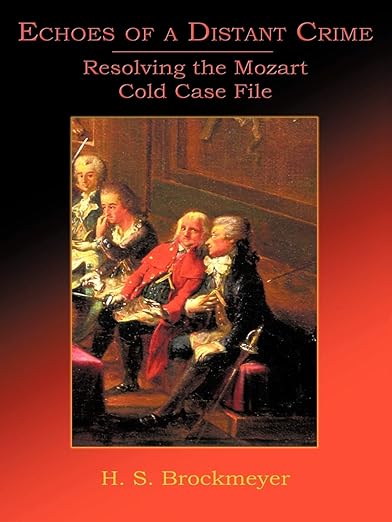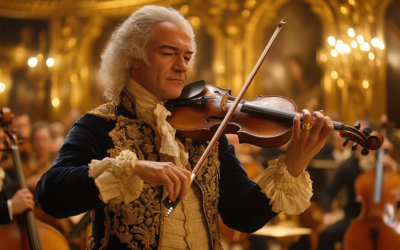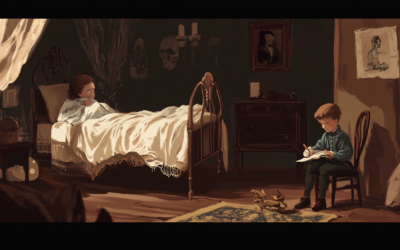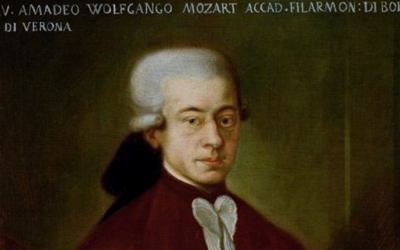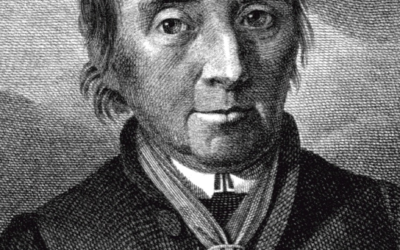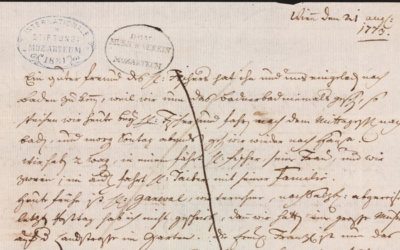Constanze Mozart in Baden bei Wien
🌿 A Spa Town, a Farewell, a Mystery
By H. S. Brockmeyer
The deep, resonant tones of the Pummerin bell in St. Stephen’s Cathedral may have inspired Mozart’s compositions for bass voices, particularly Sarastro in The Magic Flute. As he lived near the cathedral in his final year, the profound sound of the bell might have shaped his musical imagination, infusing his works with a depth that echoes through time.
"You cannot imagine how I have been aching for you all this long while. I can’t describe what I have been feeling — a kind of emptiness, which hurts me dreadfully."
Abstract
In the summer of 1791, just months before Wolfgang Amadeus Mozart’s untimely death, his wife Constanze took refuge in the serene spa town of Baden bei Wien. Sent there to recover from illness and a difficult pregnancy, she became a regular at the famed thermal baths. Yet behind the healing waters and peaceful walks lay a deeper, more turbulent story: suspicions, secrets, and a final summer that would never return. In this vivid and historically rich account, H. S. Brockmeyer reconstructs Constanze’s last months with Mozart, her relationship with Franz Xaver Süssmayr, and the layered emotional world of a woman poised between love, loss, and survival.
Baden bei Wien: The Healing Retreat
Constanze Mozart first visited Baden in 1789 after a fall and illness. Prescribed 60 thermal baths by her physician, she returned there every summer through 1791. The spa town, with its Roman origins and sulphurous springs, became her sanctuary — a place to escape the oppressive heat and stress of Vienna, and later, the site of deeply personal events that would define her final summer with Mozart.
A Composer on the Road
While Constanze recovered in Baden, Mozart embarked on a concert tour with Prince Lichnowsky, hoping for financial relief. Despite noble receptions and musical success, the tour ended in disappointment. Mozart blamed Lichnowsky for debts and poor concert returns, noting bitterly: “From the point of view of applause and glory this concert was absolutely magnificent, but the profits were wretchedly meagre.”
“Find Her a Ground-Floor Room”
Mozart was attentive even from afar. In a letter to Anton Stoll, he requested an apartment for Constanze close to the baths, preferably “on the ground floor.” Her accommodation was eventually secured on Renngasse — today still known as the “Mozart Hof”. There, Mozart composed the Ave verum corpus in June 1791 and often joined his wife for brief visits, working in a garden attic room.
Letters from a Lonely Genius
Throughout the summer, Mozart’s letters to Constanze reveal emotional strain, health concerns, and deep longing. He fretted over her bathing routines, warned against slippery floors, and lamented the distance that separated them: “Even my work gives me no pleasure… because I am accustomed to stop working now and then and exchange a few words with you.”
Shadows in Paradise: The Süssmayr Affair
One shadow loomed large: Franz Xaver Süssmayr. As Mozart’s copyist and frequent companion to Constanze, his presence in Baden sparked both suspicion and jealousy. Mozart’s letters oscillate between humor and hostility: “Give Süssmayr a few sound boxes on the ear from me… it would be a good thing if you were to leave a bump on his nose.”
Later biographers — including Ludwig Hildesheimer — have questioned the nature of Constanze’s relationship with Süssmayr. Her own words, years later, suggest a complex, possibly bitter end to their connection.
A Town of Echoes and Memories
Brockmeyer describes Baden in rich detail — its leafy parks, the women’s bathhouse (now a museum), the Rosarium with 800 varieties of roses. She imagines Constanze wandering through ruins, gathering wildflowers, resting under trees, and savoring moments of calm before everything changed.
Paradise Lost
Mozart died on 5 December 1791. Süssmayr, present at his deathbed, vanished shortly after — never to return to Constanze’s life. In the aftermath, her letters show bitterness and avoidance, while he pursued his career. Whatever bond had formed in Baden, it evaporated with the winter frost.
Final Reflections
Constanze’s spa retreat was not just about health. It was about escape, identity, and perhaps the last flicker of freedom before tragedy and reinvention. In Brockmeyer’s hands, this story becomes more than biography — it becomes a portrait of a woman at the threshold of history.
You May Also Like
The Violin Concertos: Mozart’s Borrowed Genius
Mozart’s violin concertos are often celebrated as masterpieces, but how much of the music is truly his? This article delves into the complexities behind the compositions and challenges the authenticity of some of his most famous works, revealing a story of influence, imitation, and misattribution.
#2 The Hidden Truth of Mozart’s Education
In this video, we uncover the hidden truth behind Wolfgang Amadeus Mozart’s early education and challenge the long-held belief in his effortless genius. While history often celebrates Mozart as a child prodigy, effortlessly composing music from a young age, the reality is far more complex.
The London Notebook
The London Notebook exposes the limitations of young Mozart’s compositional skills and questions the myth of his early genius. His simplistic pieces, fraught with errors, reveal a child still grappling with fundamental musical concepts.
The Mozart Question
In this revealing interview, we delve into the lesser-known aspects of Wolfgang Amadeus Mozart’s life, challenging the long-standing myth of his genius. A Swedish journalist explores how Mozart’s legacy has been shaped and manipulated over time, shedding light on the crucial role played by his father, Leopold, in crafting the career of the famed composer.
Georg Nissen and the Missing Notebooks
After Mozart's death, his widow, Constanze, found a steadfast partner in Georg Nikolaus von Nissen, a Danish diplomat who dedicated his life to preserving the composer's legacy. Nissen not only compiled an extensive biography of Mozart but also uncovered and...
Letters Under Surveillance
In a world without privacy, Leopold Mozart’s letters were carefully crafted not just to inform but to manipulate perceptions. His correspondence reveals a calculated effort to elevate his family’s status while avoiding any mention of failure or controversy.

